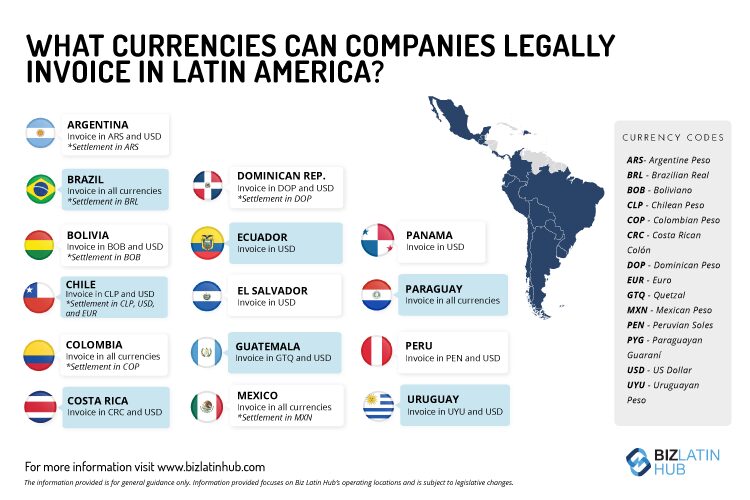Economies in Latin America are changing rapidly. One important regulatory development for many countries in the region is digital tax, because it captures services delivered online or electronically.
The OECD claims that Latin American economies are making real progress to address the tax challenges arising from the digitization of the economy. This international entity also expects that further digital tax developments in Latin America provides stability and certainty in the international tax system.
Managing your company while keeping a careful watch over new regulations is one of the challenges to overcome while doing business in Latin America.
We provide an explanation of digital tax developments in several emerging and developing economies in Latin America, so your business understands its obligations when offering digital services in these markets.
Digital tax developments in Argentina

The Argentine government levied taxes for digital services under law 27,430 and on a general basis. This regulation includes services carried out through the Internet network or any adaptation or applications, platforms or technology used by the Internet or other networks through which equivalent services are provided. By their nature, these services are basically automated and require minimal human intervention, regardless of the device used for its download, display or use.
The regulation of digital services in Argentina has been in place since 27 June 2018 and the entity the AFIP (Administración Federal de Ingresos Públicos) is in charge of regulating this matter.
If you are looking to incorporate a startup company in Argentina that offers digital services, you must understand and comply with your tax obligations for such activities. Tax percentages vary depending on the online service provided.
Brazilian digital tax regulations
The Brazilian government understands the importance of regulating digital tax developments, due to the constant evolution of technology in its economy. In Brazil, there are multiple bills that aim to establish a tax model for digital services. One of the most important is Bill No. 2358/2020, named CIDE-Digital that was proposed in May 2020.
The CIDE-Digital Bill aims to regulate the contribution of the intervention in the economic domain by establishing progressive tax rates to companies that develop the following activities:
- Running advertising in digital platforms for users located in Brazil
- Providing digital platform where users can get in touch and interact, with the objective of selling goods or services. One of the elements of this kind of platform needs to be located in Brazil
- Transmitting data of users located in Brazil and collected during the use of a digital platform or generated by those users.
Note that according to this bill, these tax rates will only apply to companies earning gross revenue BRL 3 billion globally, and BRL 100 billion in brazil annually.
Chile’s Servicio de Impuestos Internos
According to Law 21.210 that upgrades the tax system in Chile, foreign companies that provide digital services must collect and remit 19% in value-added tax (VAT) to the SII (Servicio de Impuestos Internos).
The SII has enabled a 100% online system that allows taxpayers to register with the entity and comply with the tax obligation.
Providers of digital foreign service have the obligation to declare VAT declarations since 1 June 2020.
Digital tax in Colombia with the DIAN
Colombia is one of the leading countries in terms of digital tax developments in Latin America by establishing that providers of digital services must pay 19% VAT over the digital services provided. The law allowing this was published on July of 2018 and its application initiated in January of 2019.
The application of taxes to digital services in Colombia was established in 2016 for nationals, and in 2018 they extended this obligation to non-residents. This tax is now mandatory for all digital service providers from abroad. If not implemented, the DIAN can order the different payment methods that exist in the country (credit and debit cards, prepaid cards, and collectors of cash, among others) to withhold correspondent VAT directly.
Tax on digital services in Costa Rica
The Costa Rican government also considers the importance of digital tax developments, it recently issued the resolution DGT-R-13-2020 of 11 June 2020 establishing the procedure for the collection VAT regarding digital services.
Foreign companies must collect and remit the 13% VAT from 1 August.
Similar to Colombia, Costa Rican companies will be able to declare the valued added tax directly or through credit cards.
VAT in Ecuador
Following the trend of developing a way to include taxes in digital development services in Latin America, the Ecuadorian government levies 12% VAT on digital services provided by foreign companies. This tax will be directly withheld from credit card payments.
These procedures are established by the Law of “Simplicity and Tributary Progress”. This was implemented on 1 July 2020.
Mexico’s digital tax in 2020

Mexico started developing a digital tax on services in 2018. In 2020, Congress approved the law to come into force on 1 June 2020. Essentially, the law establishes the obligation of retaining 16% VAT to digital services provided by non-resident suppliers.
Panama reviews its tax structure
Panama considers that a great number of transactions are done through digital platforms, and no tax is currently being levied on them.
Panama has not yet implemented a digital services tax, but digital tax developments appear to be on the way. The government is studying the possibility of establishing taxes for digital services provided in Panama, but given the country’s territorial tax system, it is complicated to impose a tax for foreign companies without modifying the entire tax structure.
The Panamanian government wants to comply with OECD recommendations regarding taxation of digital services, and must first identify the procedure to establish it.
Paraguay‘s digital tax to come into force in 2021
Paraguay submitted the law 6.380 of 2019 (Ley de Modernización y Simplificación del Sistema Tributario Nacional) where it establishes the obligation of retaining 10% over digital services provided by foreign companies.
Additionally, the Paraguayan government also set 15% of income tax to digital services provided from outside of the country.
These new regulations were set to initiate on 1 July 2020, but due to the international situation provoked by Covid-19, they postponed the validity of this law until 1 January 2021.
Uruguay‘s digital tax developments in 2018
In 2018, Uruguay included digital tax developments into its legal frame through the Law N° 19.535.
Like Paraguay, foreign companies providing digital services will need to pay income tax and VAT over digital activities. The VAT rate in Uruguay is 22% and foreign companies will need to keep complying with these fiscal obligations to continuing doing business in Uruguay.
How important are digital tax developments in Latin America?
Given the fast digitization of the global economy, and and steady regional development, digital tax in Latin America gains a foothold in regulating online commercial activity. More transactions are done through digital platforms, apps, or networks and the Latin American countries need to evolve alongside the digitization of the economy to ensure the payment of taxes that contributes to the development of each country.
Furthermore, entrepreneurs need to consider the evolution of the market and the legislation while building a market entry strategy to guarantee a successful startup business in Latin America. Get in touch with our legal and financial experts with a strategy in dealing with taxation in Latin America.
Learn more about our team and expert authors.






